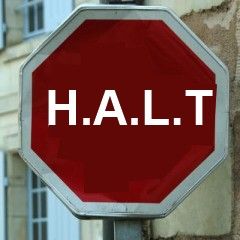Podcast: Play in new window | Download (Duration: 11:37 — 16.0MB) | Embed
Subscribe to Spark My Muse Apple Podcasts | Spotify | Email | TuneIn | RSS | Subscribe to Spark My Muse
Shownotes:
Spark My Muse
Episode 9 – Wine: moderation vs. medication (The famous HALT method)
This is a surprise “mid-week” episode. This show normally goes live each Wednesday. Episode 10 and 11 are longer special interview episodes.
Episode 10 (airing May 27th) Emily Miller writer and journalist for the Chicago Sun-Times and Relevant Magazine
Episode 11 (airing June 3rd) Daniel J. Lewis prolific creator of an entire network of podcast programs, including nationally-awarded shows on how to podcast, comedy, and the #1 rating discussion show for ABC’s series “Once Upon a Time”.
Check back for those!
This episode was brought to you by “The Daily Sharpening Ritual”–The perfect way to supercharge and renew personal awareness in your life.
The simple but effective worksheet was designed to create extra awareness and transformative improvement with minimal planning and effort.
It takes just 3-5 minutes each morning and at night.
• You can see big changes for the better in only 5 days. Give it a test try, you have nothing to lose.
(simply print out 5 copies and follow-through!)
While tipping is appreciated…these are yours to use for free.
Choose either or both options and see which one you like best:
• The SHARPENING Ritual
• The SHARPENING Ritual
(PRAYER-centered VERSION)
Wine segment
How much wine is considered “drinking in moderation”?
• Rule of thumb: 2, 5oz glasses per day is moderate drinking, and no more than one drink per hour, or four drinks per occasion (like an all-day event like a picnic or wedding)
But if it’s hard to go a day without drinking wine (or wanting to), rethinking your relationship with wine is needed.
The show details some physical repercussions of over-consuming wine, and a practical way to build mindfulness.
• If you unsure that your consumption is healthy, jot down the feelings behind the desire to consume wine so it doesn’t master you.
• Wine can too-quickly be used to medicate ourselves, and this hurts our Souls. Be mindful. :)
(“Soul” meaning what it does in Hebrew: our whole-self, mental, spiritual, creative, relational, etc)
Sparking your muse
Featuring the book by Brennan Manning called, “The Wisdom of Tenderness”.
Explaining “the HALT method” for decision-making:
Brennan Manning died last year, and he is probably best known for writing the Ragamuffin Gospel. He accumulated a lot of wisdom through life, but it didn’t come cheap. Poor choices, wrong turns, and hard lessons molded him, eventually, into a person of great compassion and grace–a sage for the poor in spirit and those smart enough to listen. Many sought him out for his wisdom.
When Manning came into recovery as an alcoholic he learned a buzzword from AA (Alcoholics Anonymous). AA folks use it as a method and smart tool to create greater awareness in those vulnerable to slipping back into alcohol abuse.
• They stay on the lookout for four qualities that make them susceptible to relapse and are encouraged to seek help when they identify them occurring in their life. Before they take a sip they look for the signs and call for backup.

If H.A.L.T., then halt.
Regular internal check for these:
H – Hungry (not just for food, but a longing in general)
A – Angry (or stressed, or frustrated)
L – Lonely (or rejected, or left out, feeling alone in the world)
T – Tired (often tired from helping others or being otherwise overcommitted)
We all need to cultivate an awareness of our vulnerabilities to avoid a slide into poor choices, creative slumps, or dangerous behavior.
Sometimes we don’t even realize our feelings while we are having them or how we are trying to soothe our selves.
Let’s develop the awareness to halt and take an internal inventory or seek help when we get run down, over-extended, or when we find ourselves feeling in some way hungry, angry, lonely, or tired.
It is awareness which is at the heart of any ingenious creative pursuit, meaningful transformation or spiritual growth.
NEW next week (May 27)…A great interview with my friend, Emily Miller (writer and journalist for the Chicago Sun-Times and regular contributor to Relevant Magazine).
JUNE 3rd, comes an interview with expert creative, Daniel J. Lewis!
Please take part in this anonymous 30-second listener-survey so I can continue to produce the show.





 Do you think in Words or Pictures?
Do you think in Words or Pictures?